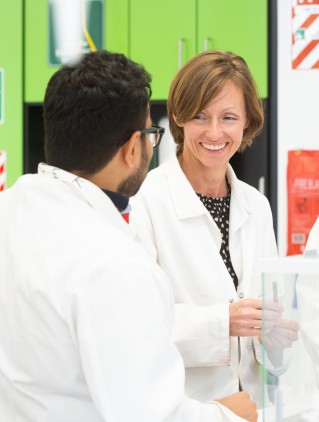Dr Jenny Malmström on running her own research lab
17 April, 2020
 When Dr Jenny Malmström arrived in New Zealand fresh out of her PhD nine years ago to take up an 18-month postdoc position at the University of Auckland, a permanent position and the prospect of her own research lab seemed a long way off.
When Dr Jenny Malmström arrived in New Zealand fresh out of her PhD nine years ago to take up an 18-month postdoc position at the University of Auckland, a permanent position and the prospect of her own research lab seemed a long way off.
Dr Malmström, who now runs her own lab at the University, says that the transition from a PhD into a permanent academic role can take time and perseverance for young researchers.
“The time between the PhD and first permanent position is a key challenge for younger researchers. I spent six years in a series of postdoc positions – firstly in the lab of Jadranka (Travas-Sejdic), and then as a MacDiarmid funded postdoc.”
Dr Malmström says that a young researcher’s first permanent job, when it eventually comes, can often bring its own challenges.
“It’s great to have the new job, but it’s common for new academics to then be given a high teaching load, and this can really make it harder to get their own research established.”
Dr Malmström says for her, this was eased by some key funding awards.
“I was lucky to be given a Rutherford Discovery Fellowship plus a Marsden FastStart in 2016, just at the time I started in a permanent position. This meant my teaching load was much lighter, and I could concentrate on my own research.”
The other thing that helped was the interdisciplinary nature of the MacDiarmid Institute, in which she was, by then, an Associate Investigator. “I’m pretty multidisciplinary myself so I fitted right in; I have a bioengineering degree, and a PhD in interdisciplinary nanoscience. So finding myself in such an interdisciplinary group of researchers in the MacDiarmid has really helped me find my feet as a researcher here in NZ."
“In general, research in New Zealand is much less interdisciplinary than in other countries. Back home (in Sweden) it’s the norm to span across everything.”
Dr Malmström, who has this year taken on the role of AMN10 Chair, says that she’s always been open to leadership roles.
“Early on in my time in the MacDiarmid Institute, I organised the student Future Leaders’ Programme. Having that behind me now as Chair of AMN10 is very reassuring.”
She says her time as, then, Associate Investigator representative on the MacDiarmid Institute Science Executive also gave her an insight into how things work within the Institute.
“It certainly helped me see what was possible within organisations and how to achieve things.”
Since being promoted to Principal Investigator in 2018, Dr Malmström says she now has her sights on the AMN10 conference in Rotorua in February 2021.
“Rotorua is quintessentially New Zealand. We have the strong relationship with Whakarewarewa Village, fantastic plenary speakers already confirmed, and exciting new aspects to the programme, including, for the first time, a Science in Society section. It’s going to be great.”


